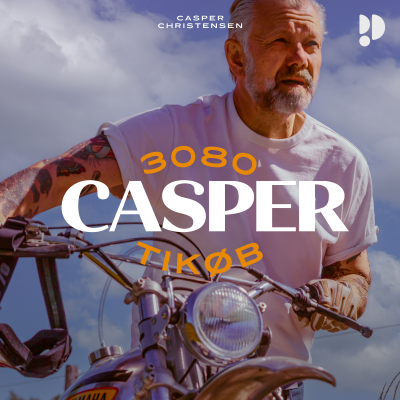
The Eric Ries Show
Podcast by Eric Ries
Founder, entrepreneur, and best-selling author of The Lean Startup Eric Ries discusses how to build profitable companies for the long-term benefit of ...
Start 7 days free trial
After trial, only 79,00 kr. / month.Cancel anytime.
All episodes
16 episodesRodney Brooks has spent his entire life at the intersection of robotics, computers, and AI. When the Roomba vacuum cleaner launched in 2002, his company, iRobot, brought all three into millions of people’s homes. iRobot had already succeeded with robots for space exploration, mine detection, search missions, and military applications. However, after the Roomba came out, it went public with a valuation of $600 million. By then, Rodney had been working on AI and robots for decades alongside the original creators of AI at Stanford and MIT. On today’s episode, we discuss: * The hype around machine learning and what’s next * Bootstrapping a startup versus taking funding * The advantages of being ambitious * The relationship between luck, risk, and success * Building robots that work with people rather than against them * How to build a trustworthy company * How he predicts what technology is on the rise * His advice to today’s builders * And much more — Brought to you by: Vanta – Automate compliance, manage risk, and prove trust—continuously. Get $1,000 off [vanta.com/eric]. Runway – The finance platform you don’t hate. Learn more [https://runway.com/?get-access=true&utm_source=eric_ries&utm_medium=newsletter&utm_campaign=q4_sponsorship]. — Where to find Rodney Brooks: • Website: https://people.csail.mit.edu/brooks/ [https://people.csail.mit.edu/brooks/] • LinkedIn: https://www.linkedin.com/in/rodney-brooks-1a137517 [https://www.linkedin.com/in/rodney-brooks-1a137517] • Bluesky: https://bsky.app/profile/rodneyabrooks.bsky.social [https://bsky.app/profile/rodneyabrooks.bsky.social] • X: https://x.com/rodneyabrooks [https://x.com/rodneyabrooks] Where to find Eric: • Newsletter: https://ericries.carrd.co/ [https://ericries.carrd.co/] • Podcast: https://ericriesshow.com/ [https://ericriesshow.com/] • YouTube: https://www.youtube.com/@theericriesshow [https://www.youtube.com/@theericriesshow] — In This Episode We Cover: (00:00) Welcome to the Eric Ries Show (03:00) Taking iRobot public (04:33) The change in company culture from private to public (06:14) Rodney’s upbringing in Australia and early experiments with computers, robots, and mathematics (7:19) The era of the computer operator (9:37) Rodney’s arrival at Stanford in 1977 and move to MIT, at the dawn of AI (11:05) His relationships with the creators of AI (12:15) What innovators of AI and general intelligence thought they were creating at the time (13:17) Rodney’s first AI startup, Lucid (14:52) What Rodney learned about building startups from the experience (18:31) Starting Light Robot, the space exploration company that eventually became iRobot (21:29) The fourteen business models on the road to success, including toys (26:03) The pivot to vacuums (29:04) Learning about the minutiae of mass production (34:43) Rodney’s thoughts on the relationship between consumers and the people who make goods (38:08) Making robots that don’t take away human agency (40:57) Building a trustworthy robotics company (43:56) Balancing low-cost and reliable products (47:00) RobustAI, Rodney’s new company (51:54) The demand and need for warehouse robots (53:39) Building robots that work with people rather than against them (58:20) Talking to warehouse workers for insight into building robots (59:20) Building startups with a high degree of difficulty (1:05:29) The advantages of ambition (1:08:03) Predicting the patterns of technology (1:11:23) The role of luck in entrepreneurship (1:12:30) Rodney’s thoughts on the current hype around AI and machine learning (1:15:34) Rodney’s advice for today’s builders (1:16:28) Lightning round You can find the transcript and references at https://www.ericriesshow.com/ [https://www.ericriesshow.com/] — Production and marketing by https://penname.co/ [https://penname.co/]. Eric may be an investor in the companies discussed.
The story of the digital content-sharing platform Gumroad challenges every aspect of the received wisdom about building successful companies. After it almost went under, founder and CEO Sahil Lavingia decided to pare down to the essentials rather than walk away. Then he took his characteristic counter-intuitiveness further and left Silicon Valley for Provo, Utah. Through it all, he never lost sight of what he was trying to do and his joy in building products. Gumroad is now thriving, with $175 million in volume last year, all thanks to Lavingia’s willingness to take a different path to success. Among the many things he’s learned along the way are the value of getting a fresh perspective and the virtue of patience – even when it’s unexciting. Commitment is often overlooked in heady times, but as he told me, “A lot of people are so concerned about catching the next train because it's the last one. They think it's over. But there are many more trains – just make sure you're at the train station. That's the important thing.” He had a lot to say about this, as well as Gumroad’s unique equity and dividend model, which it’s now sharing with other companies. Other topics we touched on include: * His long history of taking unconventional paths * How he broke into the startup ecosystem * Why building more than one product at a time is better than building a single perfect product * How to get into the wild world of AI startups * Making difficult business decisions for survival * Appreciating the opportunity to continue doing what you love * The power of equity and incentivizing for the future * And so much more — Brought to you by: Vanta – Automate compliance, manage risk, and prove trust—continuously. Get $1,000 off [vanta.com/eric]. Runway – The finance platform you don’t hate. Learn more [https://runway.com/?get-access=true&utm_source=eric_ries&utm_medium=newsletter&utm_campaign=q4_sponsorship]. — Where to find Sahil Lavingia: • Sahil’s site: https://sahillavingia.com/ [https://sahillavingia.com/] • LinkedIn: https://www.linkedin.com/in/sahillavingia [https://www.linkedin.com/in/sahillavingia] • Bluesky: https://bsky.app/profile/shl.bsky.social [https://bsky.app/profile/shl.bsky.social] • X: https://x.com/shl [https://x.com/shl] • Instagram: https://www.instagram.com/shlpaints/?hl=en [https://www.instagram.com/shlpaints/?hl=en] Where to find Eric: • Newsletter: https://ericries.carrd.co/ [https://ericries.carrd.co/] • Podcast: https://ericriesshow.com/ [https://ericriesshow.com/] • YouTube: https://www.youtube.com/@theericriesshow [https://www.youtube.com/@theericriesshow] — In This Episode We Cover: (03:15) Singapore and America as the ultimate high-growth startups (04:50) How Sahil first encountered entrepreneurship as a teen graphic designer (07:15) The new meaning of “knowledge work” (11:10) Sahil’s impressions of American possibility after growing up in Singapore and returning (16:33) Sahil’s history of deviating from the expected path (19:27) Gumroad’s path from a failed funding round in 2015 to profitability in 2023 (24:17) How Sahil broke into the startup ecosystem and his first iPhone app (27:41) Sahil’s advice for people looking to break into the new rising tide of AI (30:38) On not putting all your eggs in one product basket (32:59) How and why he left Pinterest (34:48) Surfing and treading water as business cycles (41:36) Overnight successes that are really a long time in the making (45:59) How Sahil started Gumroad (49:19) Reconciling getting fired with successfully raising money for a new company (54:26) The failure to build a billion-dollar company (1:03:42) How to prioritize survival (1:06:33) The pivotal decision to leave San Francisco for Provo, Utah (1:08:11) The current state of Gumroad (1:11:22) How Gumroad is structured to solve some of the classic business problems: equity, ownership, dividends (1:13:53) Incentivizing for the long-term (1:22:12) How Gumroad is helping other companies copy their model (1:25:16) Lightning round You can find the transcript and references at https://www.ericriesshow.com/ [https://www.ericriesshow.com/] — Production and marketing by https://penname.co/ [https://penname.co/]. Eric may be an investor in the companies discussed.
The story of Groq, a semiconductor startup that makes chips for AI inference and was recently valued at $2.8 billion, is a classic “overnight success that was years in the making” tale. On this episode, I talk with founder and CEO Jonathan Ross. He began the work that eventually led to Groq as an engineer at Google, where he was a member of the rapid eval team – “the team that comes up with all the crazy ideas at Google X.” For him, the risk involved in leaving to launch Groq in 2016 was far less than the risk of staying in-house and watching the project die. Groq has had many “near-death” experiences in its eight years of existence, all of which Jonathan believes have ultimately put it in a much stronger position to achieve its mission: preserving human agency in the age of AI. Groq is committed to giving everyone access to relatively low-cost generative AI compute, driving the price down even as they continue to increase speed. We talked about how the company culture supports that mission, what it feels like to now be on the same playing field as companies like Nvidia, and Jonathan’s belief that true disruption isn’t just doing things other people can’t do or don’t want to do, but doing things other people don’t believe can be done – even when you show them evidence to the contrary. Other topics we touched on include: * Why the ability to customize on demand makes generative AI different * Managing your own and other people’s fear as a founder * The problems of corporate innovation * The role of luck in business * How he thinks about long-term goals and growth — Brought to you by: Mercury – The art of simplified finances. Learn more [https://mercury.com/?utm_source=eric_ries&utm_medium=sponsored_newsletter&utm_campaign=24q2_brand_campaign&utm_content=homepage]. DigitalOcean – The cloud loved by developers and founders alike. Sign up [https://try.digitalocean.com/eric/]. Runway – The finance platform you don’t hate. Learn more [https://runway.com/?get-access=true&utm_source=eric_ries&utm_medium=newsletter&utm_campaign=q4_sponsorship]. — Where to find Jonathan Ross: • X: https://x.com/JonathanRoss321 [https://x.com/JonathanRoss321] • LinkedIn: https://www.linkedin.com/in/ross-jonathan/ [https://www.linkedin.com/in/ross-jonathan/] Where to find Eric: • Newsletter: https://ericries.carrd.co/ [https://ericries.carrd.co/] • Podcast: https://ericriesshow.com/ [https://ericriesshow.com/] • YouTube: https://www.youtube.com/@theericriesshow [https://www.youtube.com/@theericriesshow] — In This Episode We Cover: (04:24) Jonathan’s involvement with the DeepMind Challenge Match between AlphaGo and Lee Sedol (06:06) How Jonathan’s work Google and how it led him to that moment (08:46) Why generative AI isn’t just the next internet or mobile (10:12) The divine move in the DeepMind Challenge Match (11:56) How Jonathan ended up designing chips without the usual background (13:11) GPUs vs. TPUs (14:33) What risk really is (15:11) Groq’s mind-blowing AI demo (16:23) How Jonathan decided to leave Google and start Groq (17:30) The differences between doing an innovation project at a company and starting a new company (19:03) Nassim Taleb’s Black Swan theory (21:02) Groq’s founding story (24:12) The difference in attitude towards AI now compared to 2016 and how it affected Groq (25:46) The moment the tide turned with LLMs (28:28) The week-over-week jump from 8,000 users to 400,000 users (30:32) How Groq used HBM and what is it (the memory used by GPUs) (32:33) Jonathan’s approach to disruption (35:38) Groq’s initial raise and focus on software (36:13) How struggling to survive made Groq stronger (37:13) Hiring for return on luck (40:07) How Jonathan and Groq think about the long-term (42:25) Founder control issues (45:31) How Groq thinks about maintaining its mission and trustworthiness (49:51) Jonathan’s vision for a capital market that would support companies like Groq (52:58) How Groq manages internal cultural alignment (55:59) Groq’s mission and to preserve human agency in the age of AI how it approaches achieving it (59:48) Lightning round You can find the transcript and references at https://www.ericriesshow.com/ [https://www.ericriesshow.com/] — Production and marketing by https://penname.co/ [https://penname.co/]. Eric may be an investor in the companies discussed.
Wendy Gonzalez is the CEO of Sama, an ethical AI company that provides training and jobs with equitable pay and benefits to those who face the greatest barriers to stable employment. Among the companies it provides AI development data to are Microsoft, Ford, Walmart, Google, and many others. But before its current incarnation, Sama was a very different organization. It began as a non-profit, the brainchild and lifelong passion of its founder, Leila Janah, who sadly passed away in 2020. Her vision was to provide under-served communities in sub-Saharan Africa with opportunities for what she called “dignified work.” She believed this was the fastest and most sustainable way for people to not only gain their financial independence but to spread prosperity in their communities. Wendy and I discussed the advantages of being a company that puts human potential and intelligence first in everything it does from numerous angles. Sama’s example shows beyond a doubt that everything we’ve been taught about how to succeed in business is far from the only way – or even the best way – to thrive. In addition, we touched on: • Why it’s difficult to think long-term as a non-profit • The relationship between human judgment and AI • Why Sama became a B-Corp • The power of putting clear ethical boundaries on the work you accept • Why choosing investors that align with your mission is make-or-break • The future of AI and multi-modal models • And more — Brought to you by: Mercury – The art of simplified finances. Learn more [https://mercury.com/?utm_source=eric_ries&utm_medium=sponsored_newsletter&utm_campaign=24q2_brand_campaign&utm_content=homepage]. DigitalOcean – The cloud loved by developers and founders alike. Sign up [https://try.digitalocean.com/eric/]. Neo4j – The graph database and analytics leader. Learn more [http://neo4j.com/eric]. — Where to find Wendy Gonzalez • LinkedIn: https://www.linkedin.com/in/wendy-gonzalez-a319788/ [https://www.linkedin.com/in/wendy-gonzalez-a319788/] Where to find Eric: • Newsletter: https://ericries.carrd.co/ [https://ericries.carrd.co/] • Podcast: https://ericriesshow.com/ [https://ericriesshow.com/] • YouTube: https://www.youtube.com/@theericriesshow [https://www.youtube.com/@theericriesshow] — In This Episode We Cover: (05:17) The importance of our relationship to the people who make the products we use (06:42) The human care that goes into AI development (07:57) Sama’s mission (09:12) How Sama got to its leadership position in the creation of ethical AI (10:31) The focus on valuing human judgment in work (13:50) The Sama origin story (17:13) The informal economy vs. the formal economy (18:36) How Sama’s model helps break the poverty cycle (20:01) Giving human capital a chance to shine (21:30) Why Sama doesn’t pay people for training and the success of that approach (23:44) Leila Janah and her vision for Sama (27:38) How and why Sama converted to a for-profit company with a foundation attached (29:42) Identifying AI as the pivot (31:02) The difficulties of having a long-term plan in the non-profit world (32:49) Why Sama needed to build its own technology and raise the money to do so (36:10) How a non-profit becomes a for-profit (37:29) How Sama split into two entities: a company and a foundation (39:41) Sama’s governance structure including how the foundation is represented in the (43:56) Choosing mission-aligned investors (45:46) How Sama’s success disproves conventional business theory (52:00) Turning a liability into strategy (53:47) How Sama’s mission led it to create real value and be in position for the emergence of AI (58:06) The need for standards and ethical guidelines for the data supply chain (1:01:46) Combating bias and danger through visibility (1:03:57) The case for ethical data as a competitive strategy (1:07:21) Wendy’s thoughts on what the future of AI will bring (1:10:30) Lighting round, including the creation of Sama’s Ethics Guild (1:23:46) What Wendy wishes she’d known ten years ago You can find the transcript and references at https://www.ericriesshow.com/ [https://www.ericriesshow.com/] — Production and marketing by https://penname.co/ [https://penname.co/]. Eric may be an investor in the companies discussed.
Sal Khan arrived at the idea for Khan Academy truly organically. While working at a hedge fund, he took time in the evenings to tutor a younger cousin in math over the phone. Soon, a family tutoring network was in place, and from there, it was only a few years before Sal realized that the kind of help he was giving his family could – and should – be made available to everyone for free, across disciplines and geographic locations. Today, Khan Academy has over 170 million users and is available in 50 languages in 190 countries. To fully commit to his vision, he founded Khan Academy as a non-profit, providing advantages that companies focused on making money by any means necessary will never have. As you’ll hear, avoiding what he calls the “very strange” market forces around education has been one of the keys to Khan Academy’s ability to build deep trust and loyalty. It has also ensured a rare level of adaptability that has been especially important for Khan Academy’s role as a major early adopter of AI. Sal’s experiences with AI and education are widely applicable, as is his belief that we all have a duty to take a hand in shaping AI’s place in our world. Being open to new technology instead of fearing it can help us avoid the dystopian nightmares so many people have predicted are imminent. Equally important is his commitment to balance in all things, including salary and work-life choices not just for himself, but all Khan Academy employees. As he puts it, “Having a life can make you a better leader, thinker, and decision-maker.” His story, which has many chapters yet to come, shows that being a mission-controlled organization is no barrier to success in every sense. Other topics we touched on include: * Having a long-term vision for education * Creating value as a non-profit * His skepticism about non-profits * Why he believes in remote work * The early results of Khan Academy’s AI integration * The power of knowing what you want your life to stand for — Brought to you by: Mercury – The art of simplified finances. Learn more [https://mercury.com/?utm_source=eric_ries&utm_medium=sponsored_newsletter&utm_campaign=24q2_brand_campaign&utm_content=homepage]. DigitalOcean – The cloud loved by developers and founders alike. Sign up [https://try.digitalocean.com/eric/]. Neo4j – The graph database and analytics leader. Learn more [http://neo4j.com/eric]. — Where to find Sal Khan: • X: @salkhanacademy [https://twitter.com/salkhanacademy] • LinkedIn: https://www.linkedin.com/in/khanacademy/ [https://www.linkedin.com/in/khanacademy/] Where to find Eric: • Newsletter: https://ericries.carrd.co/ [https://ericries.carrd.co/] • Podcast: https://ericriesshow.com/ [https://ericriesshow.com/] • YouTube: https://www.youtube.com/@theericriesshow [https://www.youtube.com/@theericriesshow] — In This Episode We Cover: (04:24) Why Sal founded Khan Academy as a non-profit (06:10) How his day job as a hedge fund analyst made him think longer-term (09:26) How turning down venture capital has put Khan Academy in a better position for growth (11:24) Creating value as a non-profit (12:54) How nonprofits can fill in for government in education and healthcare (13:30) Sal’s skepticism about non-profits (16:01) The social return on investment framework (18:22) Khan Academy by the numbers (21:19) On making enough money and taking a risk to pursue a dream (22:17) The counter-intuitive hiring benefits of being a non-profit (27:46) Khan Academy as a leader in AI and education (30:05) Khan Academy’s top fears around adopting AI (32:36) How being trustworthy led to early GPT-4 access (34:04) Khan Academy’s AI experiments and results so far with Khanmigo (36:55) Sal’s hopes for AI and special needs education (38:52) Sal’s new book, Brave New Words (41:51) AI as an amplifier of human intent (43:38) The necessity of using technologies and tools we’re afraid of (44:45) Balancing material needs and self-fulfillment (48:20) Why Khan Academy has gone to fully remote work (53:18) Lightning round! You can find the transcript and references at https://www.ericriesshow.com/sal-khan/ [https://www.ericriesshow.com/sal-khan/] — Production and marketing by https://penname.co/ [https://penname.co/]. Eric may be an investor in the companies discussed.
Available everywhere
Listen to Podimo on your phone, tablet, computer or car!
A universe of audio entertainment
Thousands of audiobooks and exclusive podcasts
No ads
Don't waste time listening to ad breaks when listening to Podimo's content.
Start 7 days free trial
After trial, only 79,00 kr. / month.Cancel anytime.
Exclusive podcasts
Ad free
Non-Podimo podcasts
Audiobooks
20 hours / month



















